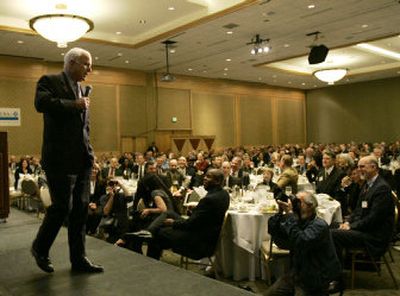In Seattle, McCain stands by war

SEATTLE – Republican presidential hopeful John McCain said Friday that British Prime Minister Tony Blair has sacrificed his career to support the Iraq war, and acknowledged he could face the same fate.
The Arizona senator, a staunch defender of President Bush’s new Iraq troop deployment strategy, said he worries a cutback of British troops in southern Iraq could lead to stronger control by “Iranian-backed Shia” forces. But he said Blair and the British deserve gratitude for their efforts.
“He has literally sacrificed his political career because of Iraq,” McCain said of Blair. “That is a great testament to his political courage.”
Asked later if he was in danger of making the same sacrifice, McCain responded simply, “Sure.”
McCain, who lost the Republican nomination to George W. Bush in 2000, is expected to announce his second campaign for the White House formally next month. He faces strong challenges from Mitt Romney, the former Massachusetts governor, and Rudy Giuliani, the ex-mayor of New York.
While on the campaign trail in recent days, McCain has spent time defending his support of Bush’s 21,500-troop buildup while also criticizing how the war has been handled.
His Friday appearance in Seattle initially focused on trade, security and diplomatic policy in Asia, which has strong economic and cultural ties to the Northwest.
Iraq quickly came up. McCain said Americans should give Gen. David Petraeus, the new commander of U.S. forces in Iraq, a chance to succeed.
“I believe that if we fail in Iraq, you will see chaos and genocide,” McCain said.
State Democrats attacked McCain on his support for the war, calling him “worse than Bush.”
“John McCain seems to have left his maverick credentials behind on his 2000 campaign bus,” said Dwight Pelz, the state Democratic Party chairman.
In later remarks to reporters, McCain affirmed his recent criticism of Donald H. Rumsfeld, the former defense secretary whom McCain recently said would likely be remembered as one of the worst in history.
He said he had not apologized to Rumsfeld for those remarks.
McCain also brushed aside questions about Vice President Dick Cheney’s assertion that McCain recently apologized for saying the vice president had “badly served” President Bush on Iraq.
“I don’t discuss my private conversations with the vice president,” McCain said.
In his speech to the World Affairs Council and the City Club of Seattle, McCain also expressed concern about the future of the U.S.-North Korea nuclear disarmament deal. The settlement has troubled conservatives who fear its terms are too lenient on the communist North.
“Last week’s agreement might be a first step on the path to a de-nuclearized Korean peninsula, but that is far from certain,” McCain said in his speech, urging the United States to proceed cautiously.
“It is unclear whether North Korea is now truly committed to real verification, a full accounting of all nuclear materials and facilities, both plutonium- and uranium-based, and the full de-nuclearization that must be the essence of any lasting agreement,” he said.
He said the United States and its allies must ensure North Korea doesn’t just temporarily suspend nuclear activities, and he said the Bush administration must verify the country has ceased support for terrorism before taking it off the list of state sponsors of terrorism.
McCain repeatedly invoked the late Sen. Henry “Scoop” Jackson, D-Wash., a social moderate and defense hawk. But McCain also drew parallels between his fiscal conservatism and the policies of President Reagan and former Arizona GOP Sen. Barry Goldwater.
Asked by an audience member if it were true he was “sucking up to the religious right,” McCain drew laughs by responding, “What’s wrong with sucking up to everybody?”
“I am convinced that we’re going to have to go back to the party of Ronald Reagan, where we may disagree on specific issues, but we share the same priorities and values,” McCain said.
McCain also planned private meetings with local backers and potential supporters. On Thursday, he picked up the support of Washington state Attorney General Rob McKenna.